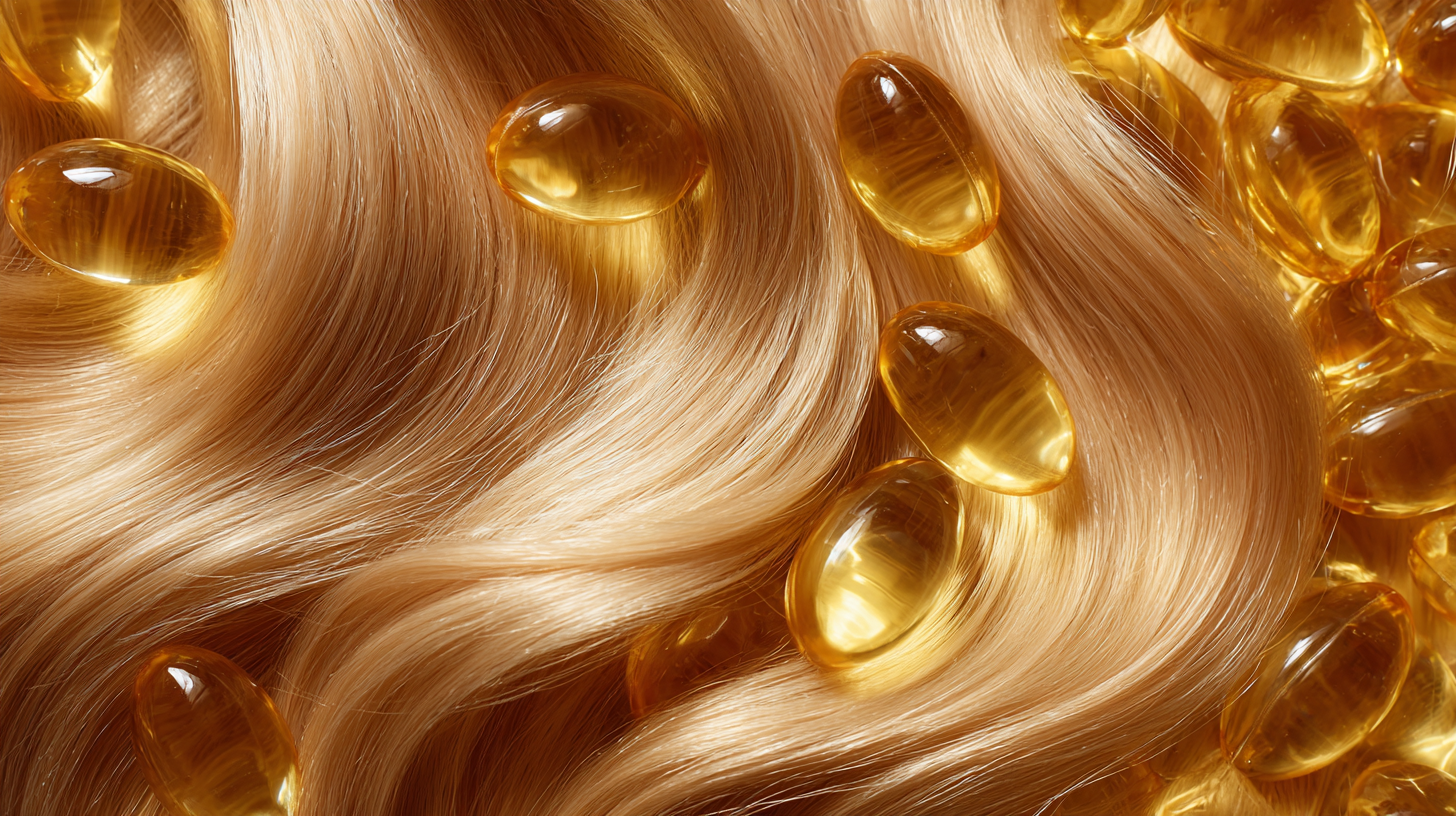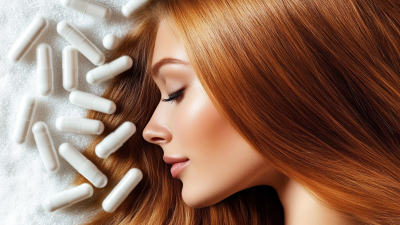
-
Home
-
Products
-
About US
-
FAQ
-
News
-
Tips
-
Contact Us
Leave Your Message
- Phone
- E-mail
- WhatsApp
- WA Business



The pursuit of healthier hair has led to a surge in the popularity of biotin dietary supplements, a trend highlighted in a recent report by Grand View Research, which projected the global biotin supplements market to reach $1.5 billion by 2028. Biotin, also known as vitamin B7, plays a crucial role in the synthesis of keratin, a key structural component of hair. According to the American Academy of Dermatology, about 30% of women and 50% of men will experience some form of hair loss in their lifetimes, driving many to seek solutions that include biotin dietary supplement hair options. Despite its increasing use, the scientific community continues to explore the extent of biotin's effectiveness on hair health, emphasizing the need for further research to substantiate anecdotal claims. As we delve into the science behind biotin and its impact on hair, it is essential to distinguish fact from fiction in the ever-expanding realm of dietary supplements.

Biotin, also known as vitamin B7, is a water-soluble vitamin that plays a vital role in various biological processes, particularly in maintaining healthy hair, skin, and nails. It helps convert nutrients into energy and supports the production of keratin, a key protein in hair. Understanding biotin's function can be beneficial for those seeking to enhance their hair health.
Incorporating biotin into your diet can be achieved through natural food sources such as eggs, nuts, seeds, and leafy greens. However, many people turn to biotin supplements to ensure adequate intake. Research suggests that biotin supplementation may improve hair thickness and reduce hair loss, especially in individuals with biotin deficiency.
It's important to note that while biotin is generally safe, excessive intake should be avoided, as it can lead to imbalances in other nutrients.
Tips for Boosting Biotin Levels:
Biotin, a B-vitamin also known as vitamin B7, has garnered significant attention for its purported role in promoting hair growth and enhancing overall hair health. This nutrient is essential for the metabolic processes that convert food into energy and plays a vital role in the synthesis of keratin, a key structural protein in hair. As a result, many individuals turn to biotin dietary supplements with the hope of reversing hair thinning and stimulating new growth.
Research indicates that biotin deficiency can lead to hair loss and brittle hair, suggesting that adequate biotin levels are important for maintaining hair vitality. While some studies support the notion that biotin supplementation may benefit those with a deficiency, its effectiveness in individuals with normal biotin levels remains inconclusive. This has led to a lively debate in both scientific and consumer circles regarding the actual impact of biotin on hair health. Increasing awareness about biotin's role in the body continues to fuel interest in its potential as a panacea for hair-related concerns.

Biotin, also known as vitamin B7, plays a crucial role in maintaining hair health through various biochemical mechanisms. It is involved in the synthesis of keratin, a fundamental protein that constitutes hair strands, thereby supporting their strength and resilience. Oral supplementation of biotin has gained popularity as a strategy to promote hair growth and combat hair loss. Recent studies indicate that biotin may enhance the proliferation of hair follicles and improve the overall quality of hair by providing essential nutrients that drive cellular energy production and metabolic processes.
The pharmacokinetics of biotin supplementation is significant in understanding its effectiveness. When ingested, biotin is absorbed in the intestines and transported in the bloodstream, where it plays its role in numerous enzymatic reactions vital for cell metabolism. Enhanced formulations, such as encapsulated biotin with improved solubility, have shown promising results in delivering optimal benefits for hair and skin health. As research continues to unveil the intricate relationship between biotin and hair vitality, it highlights the potential of dietary supplements in addressing common hair concerns, aligning with the growing consumer interest in natural health solutions.
When selecting a biotin supplement, it’s essential to consider dosage, form, and quality. The typical recommended dosage for promoting hair health ranges from 30 to 100 micrograms per day, but individual needs may vary. Starting with a lower dosage can help assess tolerance before gradually increasing it. It's advisable to consult with a healthcare professional to determine the right amount tailored to specific health goals.

The form of biotin supplements significantly impacts absorption and effectiveness. Biotin is available in various forms, including capsules, tablets, gummies, and liquid. Each form has its advantages; for instance, gummies may be more palatable, while capsules offer a quicker absorption rate. Moreover, quality factors, such as third-party testing and ingredient sourcing, ensure the supplement is free from contaminants and meets label claims. Prioritizing high-quality products from reputable brands can maximize the benefits of biotin supplementation for hair health.
In recent years, biotin has gained popularity as a crucial dietary supplement for promoting hair health. However, for optimal results, it is essential to consider combining biotin with other vital vitamins and nutrients. Vitamins such as vitamin A, vitamin C, and vitamin E, along with minerals like zinc and iron, play significant roles in maintaining healthy hair follicles and promoting hair growth. When taken collectively, these nutrients can work synergistically to enhance the body’s ability to support hair health.
Vitamin A, for instance, is known to help in the production of sebum, which moisturizes the scalp and keeps hair healthy. Vitamin C acts as an antioxidant, protecting hair from damage by free radicals while also aiding in the absorption of iron—another key nutrient in the prevention of hair loss. Furthermore, vitamin E improves blood circulation to the scalp, enriching the hair roots with essential nutrients. By integrating these vitamins and minerals alongside biotin into a daily regimen, individuals can foster a more holistic approach to hair care and potentially achieve better results in their hair health journey.
| Nutrient | Function | Recommended Daily Value (RDV) | Sources |
|---|---|---|---|
| Biotin (B7) | Supports keratin production, vital for hair strength | 30 mcg | Egg yolk, nuts, legumes |
| Vitamin A | Promotes sebum production, keeping hair moisturized | 900 mcg | Carrots, sweet potatoes, spinach |
| Vitamin C | Aids in collagen production, strengthening the hair structure | 90 mg | Citrus fruits, peppers, strawberries |
| Vitamin D | Stimulates hair follicle growth | 20 mcg | Fatty fish, fortified dairy, sunlight |
| Vitamin E | Acts as an antioxidant, protecting hair from oxidative damage | 15 mg | Nuts, spinach, avocados |
| Zinc | Supports hair tissue growth and repair | 11 mg | Meat, shellfish, legumes |





